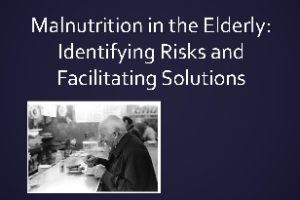May 15
Malnutrition in the Elderly

Springwell’s Nutrition Program is helping seniors better understand the risks of malnutrition and make them aware of solutions to this common problem. Malnutrition is dangerous because it leads to bone loss which can trigger falls and fractures. Diets low in calcium, a lack of adequate sun and a sedentary lifestyle contribute to bone loss. Bone density scans can help diagnose malnutrition before a fall or fracture occurs.
A frail appearance can be a sign of malnutrition but it can occur in individuals who are overweight as well. Consuming too few nutrients or consuming a diet with too much “junk food” can cause malnutrition. Excess calories with low nutritional value can cause one to be overweight while malnourished. Excess consumption of alcohol and other beverages, especially sugar laden drinks, may result in a feeling of fullness which may displace adequate consumption of nutritious food.
Many factors contribute to malnutrition. Obtaining and preparing food can be challenging due to physical or cognitive limitations that may occur with aging. Some elders contend with a decreased appetite due to nausea from medications or from being less active. A decreased sense of taste with aging may make eating less appealing. Dental issues such as missing teeth or uncomfortable dentures as well as difficulty chewing or swallowing may impede getting adequate nutrition. Some chronic diseases cause inflammation that causes muscle mass loss or reduced nutrient absorption.
Social isolation can be a risk for malnutrition. The loss of a spouse or close friend, living alone or being homebound can make food less accessible or eating less enjoyable. When one previously had someone else in the household who cooked for them, the loss of that person may bring to light a lack of meal planning and cooking skills. Low income seniors may be unable to afford sufficient amounts of nutritious foods and may instead purchase less expensive items with poor nutritional quality.
There are ways to alleviate the challenges causing malnutrition in the elderly. A starting point is to talk with your primary care physician or other health care provider about ways to get adequate nutrition for your specific circumstances. Contact Springwell to learn about our Community Dining and Home Delivered Meals programs. Lunches at Community Dining sites provide at least one third of the daily Recommended Dietary Allowance of nutrients and offer a social setting to make eating enjoyable. Our home delivered meals program addresses the accessibility to food for homebound elders and can provide special diets for several medical conditions. In honor of Malnutrition Awareness Week, talk with elders in your life about their wellbeing and help them figure out ways to meet their nutrition needs.


